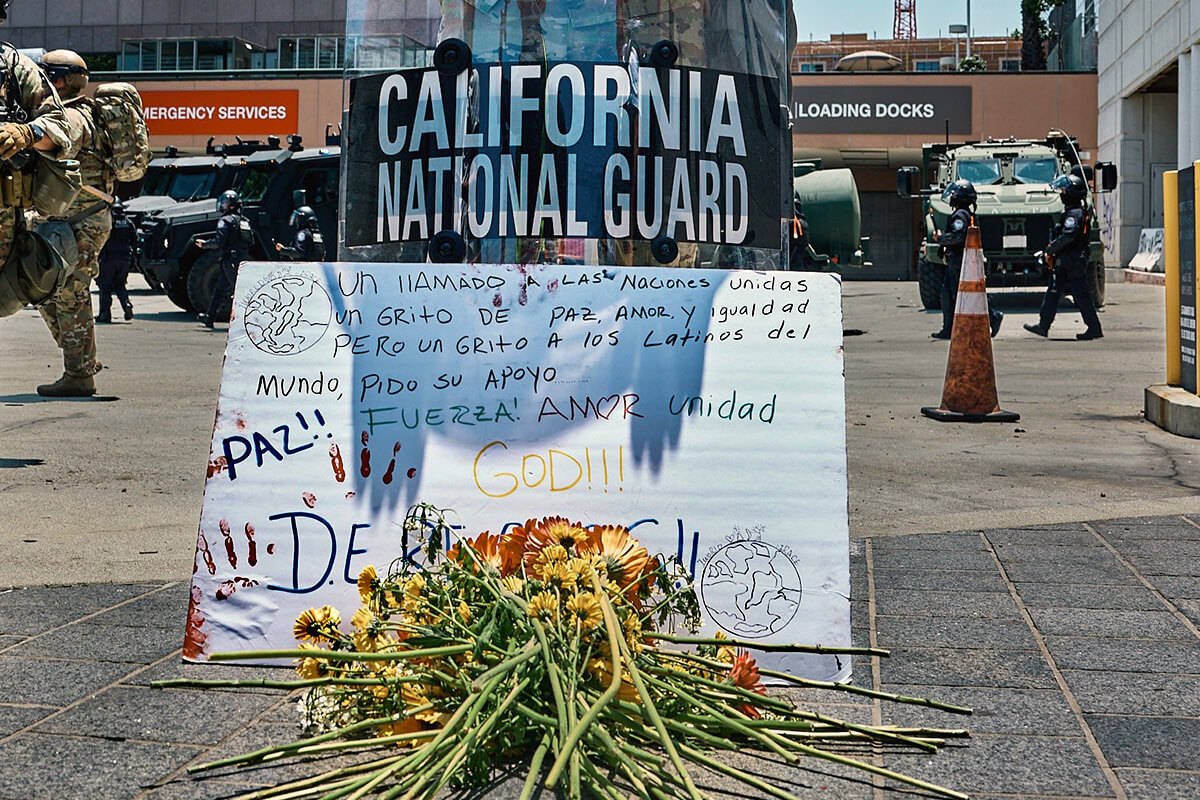Key points:
- As U.S. Immigration and Customs Enforcement operations have ramped up, United Methodists in the Los Angeles area have joined in efforts to support immigrants seeing their families torn apart.
- They also are striving to foster peace, especially after President Trump deployed National Guardsmen and Marines over the objections of California’s governor and Los Angeles’ mayor.
- United Methodist leaders stress that this is the time to “do our best work as Christians.”
United Methodists on June 10 took to the streets of downtown Los Angeles to call for the return of friends and loved ones seized by federal immigration agents.
Alongside other faith leaders, they prayed, sang and invited all who heard to heed God’s call to care for our neighbors. As a symbol of their peaceful intent, they ended their vigil by laying flowers in front of the city’s federal building — all under the watchful eye of National Guard soldiers.
“I was weeping because it was such a beautiful image, but it was also heartbreaking,” said the Rev. Allison Mark, a United Methodist pastor and speaker at the event.
“A lot of us prayed for the National Guard and the Marines. We said, ‘You have families.’ … When we placed the flowers, it marked the end of the vigil. But it also signified to us that we were there peacefully, and we’re hoping that they would be peaceful, too.”
United Methodists across the Los Angeles area are working to both support their immigrant neighbors and de-escalate a perilous situation.
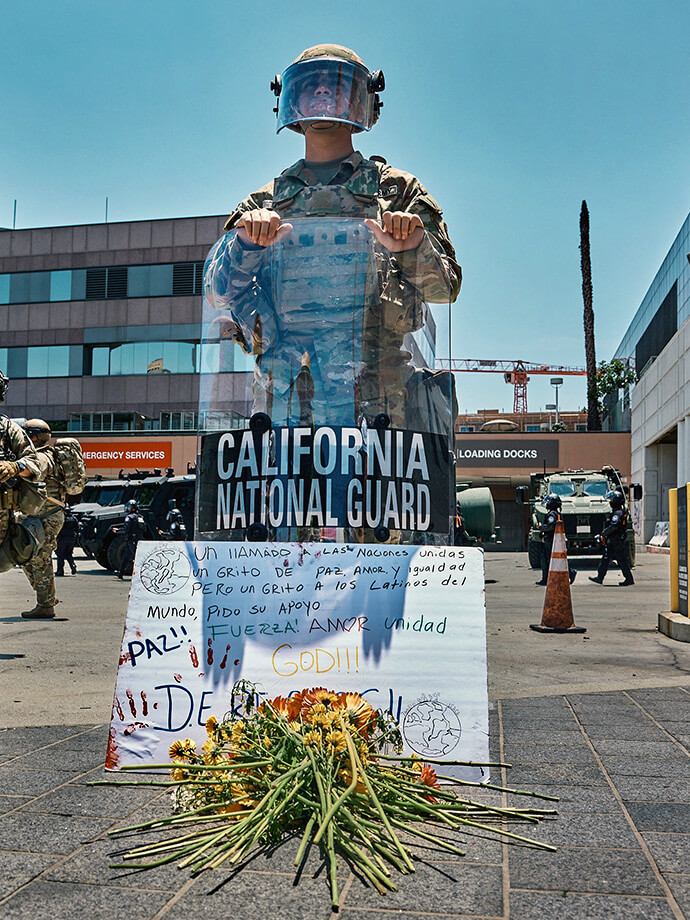
What’s happening
Protests have been ongoing in the second-largest U.S. city since June 6, when Immigration and Customs Enforcement agents began a crackdown — raiding stores, workplaces, schools and even the federal courthouse to seize people following the legal process by checking in with authorities.
The following protests — which have included peaceful demonstrations as well as violent clashes with police — prompted President Trump to mobilize some 4,000 National Guard troops and 700 U.S. Marines. He did so over the objections of state and local leaders, who say the military presence both violates the state’s legal sovereignty and risks igniting more violence.
So far, local law enforcement has been handling the arrests while the National Guard shields federal buildings. Mayor Karen Bass also has instituted an 8 p.m. curfew in downtown Los Angeles since June 10. A federal judge ruled June 12 that Trump unlawfully federalized the California National Guard, but, for now, an appeals court has put that ruling on hold. The Marines still are preparing to deploy in the city.
Protests now have spread to other U.S. cities including Austin, Texas; Chicago; Dallas; Las Vegas; Seattle and Spokane, Washington. The Trump administration also is planning to send ICE tactical teams to Northern Virginia, Chicago, New York, Philadelphia and Seattle.
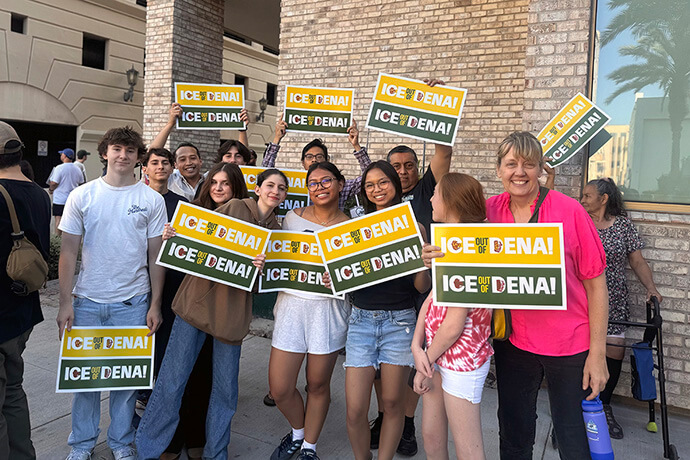
United Methodist response
Meanwhile, California-Pacific Conference Bishop Dottie Escobedo-Frank, whose area includes Los Angeles, is among the local United Methodists calling for calm. In a June 7 statement, she urged “those in power to remove their weapons of warfare from our loving neighborhoods, our peaceful cities and our welcoming states.”
Since then, she also has traveled across the Los Angeles area to bring comfort where she can.
“This is the time when we can do our best work as Christians and walk alongside those who are suffering as their families and communities are ripped apart,” Escobedo-Frank, who is herself the daughter of immigrants, told United Methodist News.
“Will we remain silent to our neighbor’s pain? Or will we hear their cries and work to stand, act and love as Christ loves us?”
The Rev. Amy Aitken, pastor of First United Methodist Church in Pasadena, said she and many in her congregation could not stay silent when they learned during Sunday worship that ICE agents were staying at nearby hotels.
She and other church members, including the church’s youth group, joined with other Pasadena residents after worship in a spontaneous demonstration against ICE. A couple of hours later, the bishop also joined the peaceful demonstration.
“We knew that ICE agents also were questioning a lot of the hotel workers inside the hotel and trying to intimidate them as well,” Aitken said. “So because of the protest, that hotel asked ICE to leave the hotel and check out. They did so around 4 o’clock.”
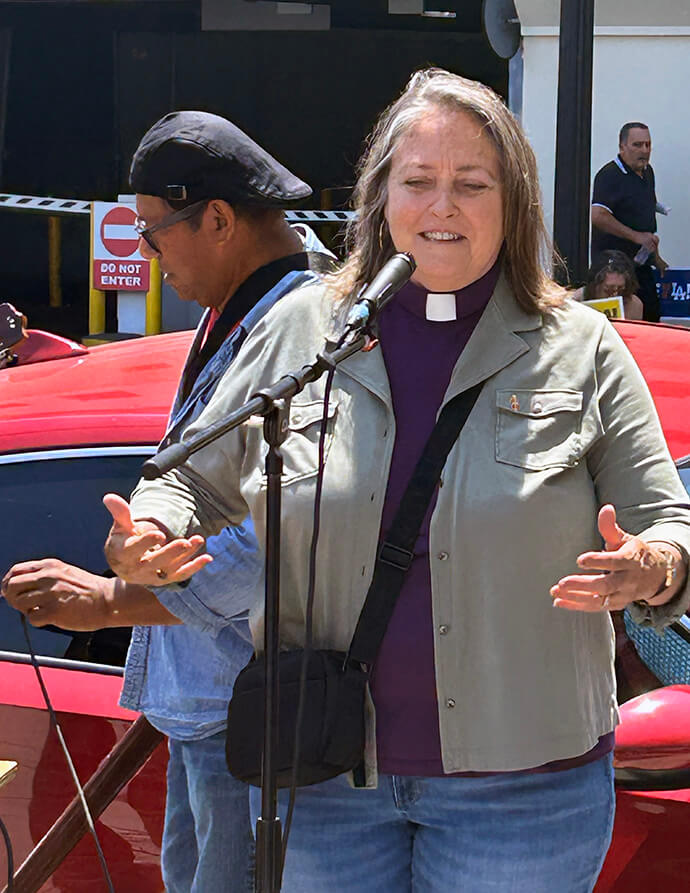
Circumstances were very different in downtown Los Angeles.
That same Sunday, the Rev. Frank Wulf, pastor of Echo Park and La Plaza United Methodist churches, had to contend with rumors that ICE was planning to raid worship services. He warned his congregations of the rumor, and about half of La Plaza’s congregation opted to worship online that day. Escobedo-Frank visited with the pastor and congregants on June 9.
La Plaza church is in the middle of where most of the protests and property destruction have taken place. Wulf noted that the agitators who wreak havoc tend to come out at night, but the police are managing the situation. He sees the military presence as only inflaming matters.
How to help
The United Methodist Board of Church and Society offers resources for calling U.S. Congress members and caring for immigrants.
In the wake of the military escalation of Immigration and Customs Enforcement raids in Los Angeles other U.S. cities, Bishop Julius C. Trimble — the agency’s top executive — urges United Methodists to pray, stand with immigrants and protest peacefully.
Clergy and Laity United for Economic Justice, a United Methodist partner in Los Angeles, has set up a fund to pay bond for detained immigrants.
MARCHA, the Hispanic/Latino caucus of The United Methodist Church, has issued a statement that stands in solidarity with immigrant communities in Los Angeles and beyond. The group is also calling on United Methodist bishops and all faith leaders “to rise in defense of the immigrant, to speak boldly against authoritarianism, and to act in alignment with the Gospel's call to justice.”
United Methodists across the California-Pacific Conference are also asking for prayer, which they believe can help in any situation.
“We would ask United Methodists to pray together and see what their churches and then their local communities can do to support their neighbors and the strangers alike,” said the Rev. Allison Mark.
“But we also want to be connectional and support one another from across state lines and national lines. I know a lot of people from other countries are watching us.”
“I would hope United Methodist churches all over the country would be praying for us,” Wulf said. “But I also think that people need to contact their national legislators to try to get some pushback against this overreach by the Trump administration.”
California-Pacific United Methodists are currently holding their annual conference, which is meeting June 11-14 in Indian Wells, California. While at the meeting, Los Angeles-area church members were troubled to hear from people back home that in their absence, ICE agents have been seen using their church parking lots and prominently circling around church neighborhoods.
Debunking misconceptions
Despite the repeated and sometimes fake images people are seeing in their social-media feeds, United Methodists and others in the area attest that Los Angeles is not a war zone. In a city of around 500 square miles, most of the demonstrations, property damage and skirmishes with police have taken place only in a few city blocks within downtown.
Still, the small scale does not make the ongoing crisis any less frightening.
Among those stepping up to help is the nonprofit Clergy and Laity United for Economic Justice, or CLUE for short. The group’s founder was the late Rev. James Lawson, a United Methodist pastor in Los Angeles who previously trained many Civil Rights Movement leaders in nonviolent resistance. To this day, the nonprofit remains a United Methodist partner and keeps Lawson’s teachings alive.
CLUE worked with an interfaith group of women to organize the June 10 prayer vigil downtown. The women modeled the vigil after the nonviolent demonstrations organized by mothers who brought attention to people’s disappearances during Argentina’s dictatorship in the 1970s and ’80s. CLUE plans to continue the vigils each Tuesday to raise awareness of immigrants being detained and deported, often without due process.
The group is offering de-escalation training to foster peaceful protests and also raising money to pay for bonds for immigrants now detained within the Los Angeles federal building.
An undocumented person in the U.S. for less than two years is eligible for expedited removal. Many of the people being detained right now have been in the U.S. for 20 years or more, said the Rev. Jennifer Guttierez, a United Methodist and CLUE’s executive director. Therefore, they should be eligible for bond while they argue their cases in court. She said bond is typically set between $1,500 and $5,000. A big concern is that those ICE has arrested have been moved to other states and even sent to countries beyond their country of origin.
“The main thing is just to get people out as quickly as possible,” Guttierez said, “because it keeps them alive, it puts them back with their families, and it helps them fight their cases in a place where their lawyer is.”
For the most part, the immigrants ICE is rounding up are not criminals. Merely being in the U.S. without documentation is not a crime but a civil offense. Instead, people arrested often have been trying to work to gain legal status within the confines of the troubled immigration system while raising families, staying employed and paying taxes.
In any case, United Methodist teachings — based on multiple Scripture passages — are clear. Under the Social Principles just revised at last year’s General Conference, church members are called “to welcome migrants, refugees, and immigrants into their congregations and to commit themselves to providing concrete support.”
Mark, who spoke at the prayer vigil, is also president of the United Methodist Board of Church and Society — the denomination’s social-witness agency that advocates for the denomination’s Social Principles.
“If we’re violating human dignity, the Social Principles say that we deplore it,” she said. “If we are harming families, the Social Principles say that we stand against it.”
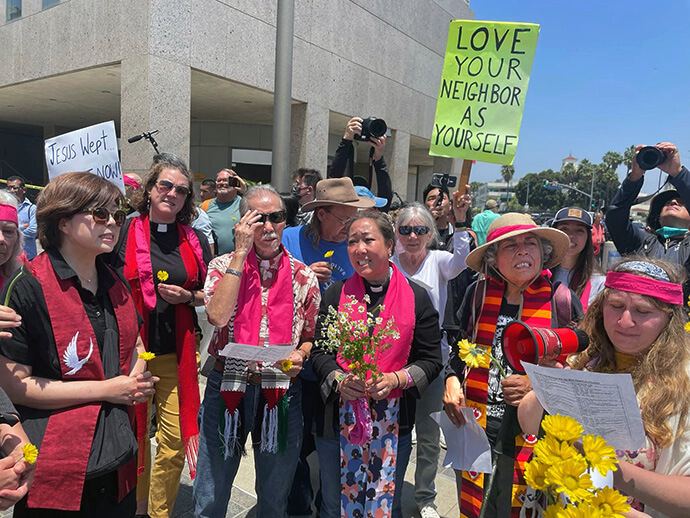
For Mark, care for immigrants is not just a matter of principle but also experience. She is the senior pastor of Faith United Methodist Church, a historically Japanese American congregation in the Los Angeles suburb of Torrance. Many of her older congregants remember when the United States forcibly relocated and detained people of Japanese descent in 10 internment camps.
“Their motto is: Never again,” Mark said. “So when Trump imposes the Muslim ban or detains children or separates families, the Japanese American community is actually quite well organized and will show up.”
Her congregation also includes Los Angeles police, who are concerned by both the anger they are seeing among some protesters but also want to stand up for human dignity. The Torrance community scrambled to find out what happened to a local 9-year-old boy, who was first sent to detention in Texas before being deported to Honduras after he and his father showed up for a routine immigration hearing in May.
Subscribe to our
e-newsletter
“We felt helpless because he was taken to another state and whisked away,” Mark said, “and that’s the language we’ve been using these days. People are being disappeared or kidnapped, because nobody knows where they’re being taken.”
Monalisa Tui’tahi, an immigration attorney and the California-Pacific Conference’s interim immigration coordinator, personally can attest that working with immigrants often brings heartbreak.
People’s appeals to stay can be dismissed through no fault of their own. The U.S. government legally can renege on previous agreements to let people stay, such as the Trump administration’s recent cancellation of temporary protected status of people from Venezuela, Haiti and Afghanistan.
Tui’tahi understands many United Methodists may be uncomfortable with protesting, but she said they can care for what’s happening with their neighbors.
“If we are going to survive this time,” Tui’tahi said, “we just have to be neighbor and family and friends to each other.”
Hahn is assistant news editor for UM News. Contact her at (615) 742-5470 or [email protected]. To read more United Methodist news, subscribe to the free UM News Digest.

